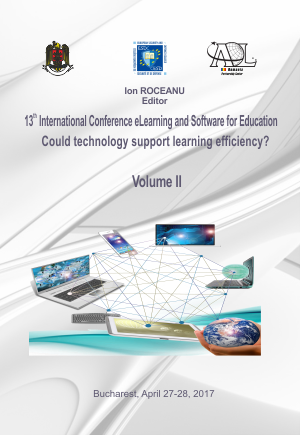CRITICAL CONSIDERATIONS ABOUT THE ADOPTION OF TECHNOLOGY-INTEGRATED TEACHING METHODS IN HIGHER EDUCATION
CRITICAL CONSIDERATIONS ABOUT THE ADOPTION OF TECHNOLOGY-INTEGRATED TEACHING METHODS IN HIGHER EDUCATION
Author(s): Manuela EPURE, Lorena-Clara MIHĂEȘSubject(s): Social Sciences
Published by: Carol I National Defence University Publishing House
Keywords: Computer-mediated education; higher education; new technologies; teaching methods.
Summary/Abstract: Computer-mediated education; higher education; new technologies; teaching methods. Following the advent of the new technologies in the wake of the Fourth Industrial Revolution, teaching and learning have entered a new era. As more and more things around us are becoming "smart" overnight and many jobs, together with part of people's lives, have moved in the virtual space, learning cannot have stayed put. The novel face of education is now being shaped by technology-integrated methods, which have permeated all levels and seem unstoppable on their way to conquer new territories and to open new horizons. However, if primary and secondary education appear to be more open to foster them, higher education is still divided as to if and to what degree information technology may be beneficial. Considered by some shallow and irrelevant and so completely disregarded, and by others too expensive to be worthwhile, computer-mediated education has already been enthusiastically embraced by a great part of the academia, who maintains that the future of tertiary education is digital. We are now witnesses to the proliferation of online and distance learning degrees, which no longer require the physical presence and involvement of a teacher in the learning process. Wider access of public and revenue opportunities for the institutions that organise them compensate for the teacher's taking a step back. The present endeavour will attempt to analyse whether the reticence about the use of technologies in higher education is justified or not, and whether their adoption and integration within the traditional seminars and lectures will necessarily improve the learning outcomes.
Journal: Conference proceedings of »eLearning and Software for Education« (eLSE)
- Issue Year: 13/2017
- Issue No: 02
- Page Range: 77-83
- Page Count: 7
- Language: English

